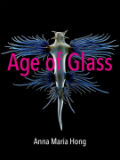Seduced by the obvious. Borne forth
on a bunch of white bull too crass and flaw-
less to resist. A back like plunged surf.
A sun of terminal pump and paw. All fatuous thought gone to one. The globe
reduced to glide and spun. The eye a ship
of sapped expanse. Eternity disrobed.
The bending of his blended bones. A grip within my planted lunge. The inner pin
of infinite numb. Never thinking of home.
Obliterate elixir. Heat so thin.
And nothing outside the animalistic form. The repeated rub of endless project.
The balance between us hung like logic.
Europa
Anna Maria Hong
Feature Date
- March 16, 2019
Series
Selected By
Share This Poem
Print This Poem
Copyright © 2019 by Anna Maria Hong.
All rights reserved.
Reproduced by Poetry Daily with permission

Anna Maria Hong’s novella, H&G, won the A Room of Her Own Foundation’s inaugural Clarissa Dalloway Prize and will be published by Sidebrow Books in 2018. Her second poetry collection, Fablesque, won Tupelo Press’s Berkshire Prize and is forthcoming from Tupelo in 2019. A former Bunting Fellow at the Radcliffe Institute for Advanced Study, she has published poetry and fiction in over 50 journals and anthologies, including The Nation, The Iowa Review, Poetry, Ecotone, POOL, Green Mountains Review, Bennington Review, Harvard Review, 250 Poems: A Portable Anthology, Verse Daily, and The Best American Poetry.
Winner of the 2017 CSU Poetry Center First Book Competition, Selected by Suzanne Buffam
“Hong’s innovative sonnets elevate the natural and human world by preserving it, and yet these sonnets also break the glass or disfigure the glass, ‘it is our glass to raise and smash,’ to allow for deeper truths about sexism, misogyny, and power structures, to emerge. Hong works to expose cracks in the glass of language, fairytales, myths, and fables and with her pen she makes more cracks. In the Age of Glass, anything can break, and many things perhaps should be broken.”
—Anita Olivia Koester
“‘The engine of alchemy / was rage. The small man’s history of winning / was long but irrelevant,’ remarks Anna Maria Hong midway through Age of Glass. This caustic suite of ludic sonnets upcycles old stories—myths, fairytales, fables, cliches into bright, prismatic spells—for the end of days. ‘Slant reuses / the cant of the box,’ the canny speaker incants. ‘A palindrome pulse / recalibrates luck.’ Open this book to any page and you’ll be met with lines so timely, so tonic, and so lexically dexterous you’ll feel enchanted, however fleetingly, to cohabit this age.”
—Suzanne Buffam
“Like the 17th-century Mexican poet Sor Juana Inés de la Cruz, whose sonnets echo and upstage a notably male and European literary tradition, Anna Maria Hong demonstrates in her own labyrinthine sonnets ‘the monstrous breadth’ of her poetic abilities, offering in them radical interpretations of myths and fairy tales that speak to our time and dazzle us with their wit and linguistic virtuosity. No one is writing like Anna Maria Hong in this Age of Glass.”
—Rosa Alcalá
“Anna Maria Hong’s poems—in this case a book of astoundingly innovative sonnets—confirm to us the credo we store in our hearts: that with intelligence, musicality and a love of language poetry can make any subject compelling and revelatory. But it takes a poet with a rare talent like Anna Maria Hong to make us see and joyously declaim what we believe. Age of Glass is a book I’ve been hoping to read for a long time, from a poet whose work I’ve admired for a longer time.”
—Khaled Mattawa
“The sonnet, that most venerable of verse forms, can never go out of fashion for long, because there’s always someone out there revitalizing it. One such someone is Anna Maria Hong, whose terrific book, Age of Glass, consists almost exclusively of sonnets that revel in the intricacies of their artifice. Anna Maria Hong will build a poem on variants of a rhyme (misogynist, grist, zest, testy, beast), exulting in the surprises in store when you let the sounds of the words direct you to their meanings: ‘Like a moron one persists, like a priest / or catechist chanting at a bris.’ But her verbal brilliance is not all this poet offers. She gives us life in its raw vitality. We see through Age of Glass darkly but accurately. Sometimes she makes us laugh: ‘The fuck you in me crosses the street to / avert the fuck you in you.’ Fierce intelligence is always at work, whether the subject is a figure of myth or fable (such as Cassandra, Pandora, Circe, and Medea) or the ‘ages’ of woman and man.”
—David Lehman
Poetry Daily Depends on You
With your support, we make reading the best contemporary poetry a treasured daily experience. Consider a contribution today.




